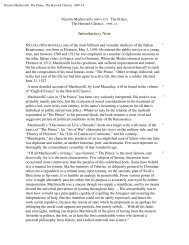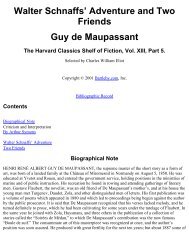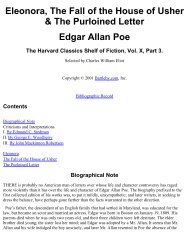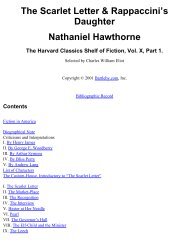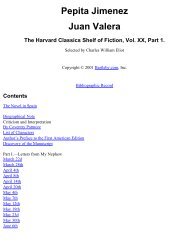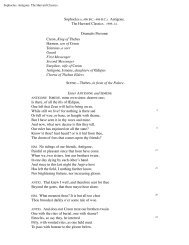Notre Dame de Paris - Bartleby.com
Notre Dame de Paris - Bartleby.com
Notre Dame de Paris - Bartleby.com
You also want an ePaper? Increase the reach of your titles
YUMPU automatically turns print PDFs into web optimized ePapers that Google loves.
into the divine symbols in which they continue to express themselves. Here you get edifices accessible to<br />
every spirit, every intelligence, every imagination; symbolic still, but as easily un<strong>de</strong>rstood as the signs of<br />
Nature. Between this style of architecture and the theocratic there is the same difference as between the<br />
sacred and the vulgar tongue, between hieroglyphics and art, between Solomon and Phidias.<br />
In fact, if we sum up what we have just roughly pointed out—disregarding a thousand <strong>de</strong>tails of proof<br />
and also exceptions to the rule—it <strong>com</strong>es briefly to this: that down to the fifteenth century, architecture<br />
was the chief recor<strong>de</strong>r of the human race; that during that space no single thought that went beyond the<br />
absolutely fundamental, but was embodied in some edifice; that every popular i<strong>de</strong>a, like every religious<br />
law, has had its monuments; finally, that the human race has never conceived an important thought that it<br />
has not written down in stone. And why? Because every thought, whether religious or philosophic, is<br />
anxious to be perpetuated; because the i<strong>de</strong>a which has stirred one generation longs to stir others, and to<br />
leave some lasting trace. But how precarious is the immortality of the manuscript! How far more solid,<br />
enduring, and resisting a book is the edifice! To <strong>de</strong>stroy the written word there is need only of a torch<br />
and a Turk. To <strong>de</strong>stroy the constructed word there is need of a social revolution, a terrestrial upheaval.<br />
The barbarians swept over the Coliseum; the <strong>de</strong>luge, perhaps, over the Pyramids.<br />
In the fifteenth century all is changed.<br />
Human thought discovers a means of perpetuating itself, not only more durable and more resisting than<br />
architecture, but also simpler and more easy of achievement. Architecture is <strong>de</strong>throned, the stone letters<br />
of Orpheus must give way to Gutenberg’s letters of lead.<br />
The Book will <strong>de</strong>stroy the Edifice.<br />
The invention of printing is the greatest event of history. It is the parent revolution; it is a fundamental<br />
change in mankind’s mo<strong>de</strong> of expression; it is human thought putting off one shape to don another; it is<br />
the <strong>com</strong>plete and <strong>de</strong>finite sloughing of the skin of that serpent who, since the days of Adam, has<br />
symbolized intelligence.<br />
Un<strong>de</strong>r the form of printing, thought is more imperishable than ever; it is volatile, intangible,<br />
in<strong>de</strong>structible; it mingles with the very air. In the reign of architecture it became a mountain, and took<br />
forceful possession of an era, of a country. Now it is transformed into a flock of birds, scattering to the<br />
four winds and filling the whole air and space.<br />
We repeat: who does not admit that in this form thought is infinitely more in<strong>de</strong>lible? The stone has<br />
be<strong>com</strong>e inspired with life. Durability has been exchanged for immortality. One can <strong>de</strong>molish substance,<br />
but how extirpate ubiquity? Let a <strong>de</strong>luge <strong>com</strong>e—the birds will still be flying above the waters long after<br />
the mountain has sunk from view; and let but a single ark float upon the face of the cataclysm, and they<br />
will seek safety upon it and there await the subsiding of the waters; and the new world rising out of this<br />
chaos will behold when it wakes, hovering over it, winged and unharmed, the thought of the world that<br />
has gone down.<br />
And when one notes that this mo<strong>de</strong> of expression is not only the most preservative, but also the<br />
simplest, the most convenient, the most practicable for all; when one consi<strong>de</strong>rs that it is not hampered by<br />
a great weight of tools and clumsy appurtenances; when one <strong>com</strong>pares the thought, forced, in or<strong>de</strong>r to<br />
translate itself into an edifice, to call to its assistance four or five other arts and tons of gold, to collect a<br />
mountain of stones, a forest of wood, a nation of workmen—when one <strong>com</strong>pares this with the thought<br />
that only asks for a little paper, a little ink, and a pen in or<strong>de</strong>r to be<strong>com</strong>e a book, is it any won<strong>de</strong>r that




